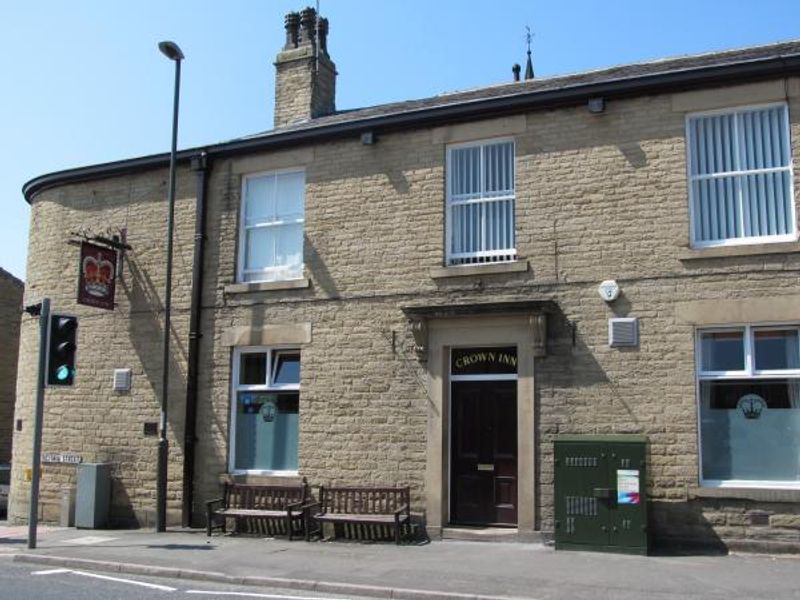This website is currently in beta. If you wish to go back to the current site please click here. To provide feedback or find out more about this site, please click here.


Let us know your thoughts by leaving a score
End-of-terrace local, a few minutes from the town centre and railway station. An attractive curved bar serves two side snugs, with real fires in winter, and a pool/games room. Pictures of bygone Glossop add to the traditional character. Prices are keen and the brewery’s bottled beers, along with their 'Cider Reserve' are also available. An enclosed outdoor drinking area is provided in the rear yard. The cask 'Old Brewery Bitter' was removed from sale during 2020, but was reinstated in June 2024 and is now served by handpump from wooden casks.
Three star - A pub interior of outstanding national historic importance
Listed status: Not listed
An end-of-terrace traditional local with a little-altered four-room interior, the Crown was built in the 1840s and refitted both in later Victorian and inter-war times. Beyond the porch lies a lobby bar with an unusually ornamented bar counter and two sets of bar-back shelves, both of which could be Victorian but perhaps later (the mirror in the bar back blocking an outside window suggests a change at some time). Three rooms lead off the lobby, starting with the front snug, still with its inter-war fixed seating and tiled fireplace. The rear snug was a living room until the 1960s but is fitted out in suitably traditional style. The long, spacious games room to the left has fixed seating curving round it but has suffered removal of its fireplace. The three bracket-shaped features round the walls are air vents (with cast-iron grilles outside).
At the end of a stone-built 1847 terrace and owned by Samuel Smiths since 1977. Previous owners include Chesters Brewery and locals say there is another brewery name in mosaic under the carpet in the front door porch. It retains a lobby bar and three rooms (one brought into pub use) and there are some fittings from an inter-war refurbishment. It is run on traditional lines as a 'good beer and good conversation' pub with no food or electronic distractions.
A full-height glazed screen separates the porch from the smallish lobby bar. In the latter you will often find as many people as in the rest of the pub! - note the shelves on the wall for stand-up drinking. At the rear is the servery with a solid, probably Victorian, mahogany counter. The bar-back consists of three small fittings of the same style which all look old, but the cabinets on the rear and right sides have some modern additions. There has been the usual loss of lower shelving on the rear section to accommodate two fridges. A local who first came into the pub in c.1950 confirms that the only changes to the servery has been the addition of a wooden structure to reduce the ceiling height.
On the left is a large room which has been this size since Victorian times as shown by the bench seating running around most of the room. It has a pair of plain baffles as you enter, two decorative ceiling roses, has a raised area for darts but has lost its fireplace. Note the three bracket-shaped air vents (mirrored outside by iron grilles)
To the right are two snugs, the front one retains interwar fixed seating, a baffle by the door, and a tiled fireplace with a marble effect overmantel. The cast-iron tables add to the traditional feel of this room. The rear snug has been in pub use since at least the 1960s and has fixed seating and a modern cast-iron fireplace.
On the rear left is a short passage to the toilets with inter-war wording in the doors of 'Ladies' and 'Gents' painted red in etched and frosted windows, probably dating from the 1930s or 1950s. The toilets themselves are modernised.
Crown Inn, Glossop